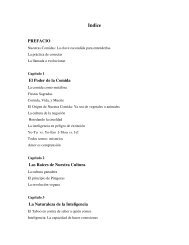The World Peace Diet: Eating For Spiritual Health And Social Harmony
The World Peace Diet: Eating For Spiritual Health And Social Harmony
The World Peace Diet: Eating For Spiritual Health And Social Harmony
Create successful ePaper yourself
Turn your PDF publications into a flip-book with our unique Google optimized e-Paper software.
296 / the world peace diet<br />
14. Mason, p. 137.<br />
15. Leonardo da Vinci, Notes, cited in <strong>And</strong>rea Wiebers and David Wiebers, Souls Like<br />
Ourselves (Rochester, MN: Sojourn Press, 2000), p. 62.<br />
16. Joanne Stepaniak, Being Vegan (Los Angeles: Lowell House, 2000), p. 3.<br />
Chapter 3—<strong>The</strong> Nature of Intelligence<br />
1. See, for example, John Bradshaw, Bradshaw on: <strong>The</strong> Family (Deerfield Beach, FL:<br />
<strong>Health</strong> Communications, 1988, 1996).<br />
2. Charles Fillmore, “Vegetarianism,” Unity Magazine, June 1915.<br />
3. Charles Fillmore, “<strong>The</strong> Vegetarian,” Unity Magazine, May 1920.<br />
4. Charles Fillmore, “<strong>The</strong> Unity Vegetarian Inn” (Unity Village, MO).<br />
5. Keith Akers, <strong>The</strong> Lost Religion of Jesus (New York: Lantern Books, 2000), p. 157.<br />
6. Gregory Bateson, Mind and Nature (New York: Bantam, 1979), p. 12.<br />
7. <strong>For</strong> a discussion of some of the unexplained dimensions of intelligence in animals,<br />
see Rupert Sheldrake, Dogs That Know When <strong>The</strong>ir Owners Are Coming Home<br />
and Other Unexplained Powers of Animals (New York: Three Rivers Press, 1999)<br />
and also his Seven Experiments That Would Change the <strong>World</strong> (New York: Inner<br />
Traditions, 2002), as well as Jean Houston, Mystical Dogs: Animals as Guides to<br />
Our Inner Life (Makawao, HI: Inner Ocean Publishing, 2002). <strong>The</strong>se are only a<br />
small sampling of the books addressing this theme.<br />
8. Dan Kindlon and Michael Thompson, Raising Cain: Protecting the Emotional Life<br />
of Boys (New York: Ballantine, 1999), p. 174.<br />
9. Rainforest Alliance Newsletter, September 2001, p. 1.<br />
10. Greg Critser, Fat Land (New York: Houghton Mifflin, 2003), p. 171.<br />
11. Ronald Goodman, Circumcision: <strong>The</strong> Hidden Trauma (Boston: Vanguard<br />
Publications, 1997).<br />
12. Paul M. Fleiss, “Protect Your Uncircumcised Son: Expert Medical Advice for<br />
Parents,” Mothering, November–December 2000, p. 44.<br />
13. John Robbins, <strong>The</strong> Food Revolution: How Your <strong>Diet</strong> Can Save Your Life and the<br />
<strong>World</strong> (Berkeley: Conari Press, 2001), p. 48.<br />
14. John Robbins, <strong>Diet</strong> for a New America (Walpole, NH: StillPoint, 1987), p. 330.<br />
15. <strong>The</strong> United States, for example, has one of the highest per capita rates of animal<br />
food consumption in the world and also has the highest incarceration rate. With<br />
only four percent of the world’s population, the U.S. has twenty-five percent of the<br />
world’s prisoners; the country with the most animal prisoners also has the most<br />
human prisoners.<br />
16. Amnesty International, Torture <strong>World</strong>wide: An Affront to Human Dignity (New<br />
York: Amnesty International, 2000), p. 2. See also www.amnestyusa.org.<br />
17. Ibid., pp. 112–113.<br />
18. Jim Mason, “Inside a Turkey Breeding Factory: Of Rape and Pillage,” Farm<br />
Sanctuary News, Fall 1997, pp. 5–7.<br />
19. U.S. Bureau of Justice Statistics, Criminal Victimization, 2003 (Washington DC:<br />
September 2004). See R.A.I.N.N. (Rape, Abuse, & Incest National Network),<br />
www.rainn.org/statistics.html. In 2003 there were 198,500 victims of rape or sexual<br />
assault (one every roughly two minutes), and 87,000 victims of completed rapes<br />
(one every six minutes).<br />
20. Michael Greger, “SARS: Another Deadly Virus from the Meat Industry,” VegNews<br />
May–June, 2003, p. 10.<br />
Chapter 4—Inheriting Our Food Choices<br />
1. Joseph Mercola and Rachael Droege, “Why Junk Food Is so Tempting, and How to<br />
Beat Your Temptation,” Mercola-com e-newsletter, Issue 516, March 17, 2004.



